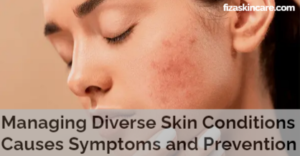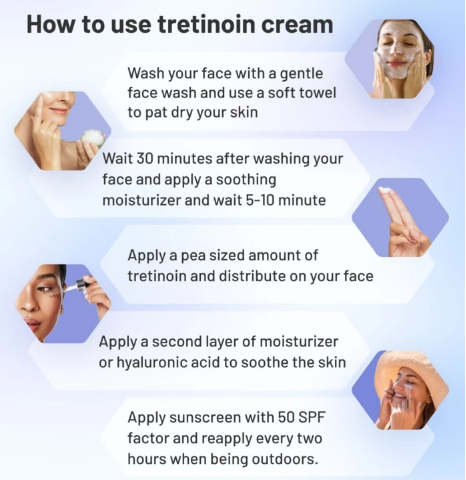Skin conditions encompass a broad diapason of conditions that can affect individualities of all periods and backgrounds. From common issues like ringworm to more complex diseases similar as psoriasis and hidradenitis suppurativa, understanding these conditions is pivotal for effective operation. In this composition, we will claw into colorful skin conditions, exploring their causes, symptoms, and available treatment.

-
Ringworm
Ringworm, despite its name, isn’t caused by worms but by a group of fungi known as dermatophytes. This contagious skin infection frequently presents as red, itchy, and indirect rashes. Antifungal specifics are generally used for treatment.
-
Psoriasis
Psoriasis is a habitual autoimmune condition that results in the rapid-fire buildup of skin cells, leading to thick, Argentine scales and red patches. Topical treatments, phototherapy, and systemic specifics help manage psoriasis symptoms.
-
Scabies
Caused by a bitsy mite, scabies leads to violent itching and a papule- suchlike rash. tradition creams and oral specifics effectively treat scabies and help its spread.
-
Impetigo
Impetigo is a largely contagious bacterial skin infection characterized by red blisters that rupture and form honey- colored crusts. Antibiotics, either topical or oral, are used for impetigo treatment.
Impetigo generally begins as red blisters that snappily rupture, slush fluid, and also form a characteristic golden- unheroic crust. The infection can be spread through direct contact with an infected person or by touching polluted shells. Scratching the affected areas can also contribute to the spread of the bacteria.
-
Cellulitis
Cellulitis is a bacterial skin infection that causes greenish Ness, swelling, and tenderheartedness. Antibiotics are essential for treating cellulitis and precluding its spread to deeper napkins.
-
Vitiligo
Vitiligo is a condition where the skin loses saturation, performing in white patches. While there’s no cure, treatments like topical corticosteroids and phototherapy can help manage symptoms.
-
Hidradenitis Suppurativa
This habitual skin condition involves painful lumps under the skin, generally in areas where skin rubs together. Treatment options include antibiotics, anti-inflammatory specifics, and in severe cases, surgery.
-
Seborrheic Dermatitis
Seborrheic dermatitis is a common, habitual skin condition that causes red, scaled patches, especially on the crown. Antifungal soaps and topical corticosteroids are frequently used for operation.
-
Molluscum Contagiosum
Molluscum contagiosum is a viral skin infection characterized by small, meat- colored bumps. While the condition is generally tone- limiting, junking ways similar as cryotherapy may be considered.
-
Shrine Psoriasis
Shrine psoriasis is the most common form of psoriasis, presenting as raised, red patches covered with a Argentine-white coating. Treatments include topical specifics, phototherapy, and systemic specifics.
-
Atopic Dermatitis
Also known as eczema, atopic dermatitis causes itchy and lit skin. Treatment involves moisturizers, topical corticosteroids, and in severe cases, systemic specifics.
-
Urticaria
Urticaria, or hives, is characterized by raised, itchy welts on the skin. Antihistamines are generally used for managing urticaria symptoms.
-
Lichen Sclerosis
Lichen sclerosis is a habitual skin condition affecting the genital and anal areas, causing white, thin patches. Treatment includes corticosteroid creams and ointments.
-
Steven Johnson Syndrome (SJS)
SJS is a severe, rare skin response frequently touched off by drug. Hospitalization and probative care are essential for managing this potentially life- changing condition.
-
Dyshidrosis Pompholyx
Dyshidrosis pompholyx, or dyshidrotic eczema, results in small pocks on the hands and bases. Treatment involves topical corticosteroids and avoiding eventuality triggers.
How can Affect conditions in skin
Skin conditions can be told by colorful factors, including genetics, environmental factors, life choices, and overall skin health. It’s important to note that while I can give general information, it’s pivotal to consult with a healthcare professional for accurate opinion and substantiated advice. Then are some factors that can affect skin health and contribute to skin conditions
-
Genetics
Some skin conditions, similar as psoriasis, eczema, and acne, can have a inheritable component. However, you may be more susceptible, If your family has a history of certain skin conditions.
Environmental Factors
- UV Radiation Exposure to ultraviolet (UV) radiation from the sun or artificial sources can lead to colorful skin issues, including sunburn, unseasonable aging, and an increased threat of skin cancer.
- Pollution Air pollution and environmental poisons can contribute to skin problems by causing inflammation and oxidative stress.
Life Choices
- Diet Nutrition plays a part in skin health. A balanced diet with acceptable vitamins, minerals, and antioxidants can support skin function.
- Hydration Dehumidification can affect the skin’s plainness and texture. Drinking enough water is essential for overall skin health.
- Smoking and Alcohol Smoking and inordinate alcohol consumption can contribute to unseasonable aging and colorful skin diseases.
-
Hormones
Hormonal changes, similar as those being during puberty, gestation, and menopause, can impact the skin. Conditions like acne may be told by hormonal oscillations.
-
Stress
habitual stress can negatively impact the skin and complicate being skin conditions. Stress operation ways, similar as exercise and relaxation, can be salutary.
-
Personal Care Products
Harsh or prickly skincare products can contribute to skin issues. It’s important to choose products suitable for your skin type and be aware of implicit allergens.
-
Infections and disinclinations
Bacterial, viral, or fungal infections can lead to colorful skin conditions. also, antipathetic responses to certain substances, similar as pollen or certain skincare constituents, can beget skin problems.
-
Autoimmune Conditions
Autoimmune conditions, where the vulnerable system inaptly attacks healthy cells, can manifest in the skin. Conditions like lupus and scleroderma can affect skin health.
-
Specifics
Some specifics may have skin- related side goods. It’s important to bandy implicit skin issues with your healthcare provider when starting a new drug.
How can avoid and save your skin in all conditions
Maintaining healthy skin involves a combination of good skincare practices, a balanced life, and defensive measures. While it’s insolvable to fully avoid all skin conditions, you can take way to minimize pitfalls and promote overall skin health. Then are some general tips
-
Regular sanctification
Cleanse your skin regularly to remove dirt, oil painting, and contaminations. Use a mild, scent-free cleaner suitable for your skin type.
-
Hydration
Stay well-conditioned-doused by drinking an acceptable quantum of water. Hydration helps maintain skin plainness and overall health.
-
Sun Protection
cover your skin from the dangerous goods of UV shafts by using sunscreen with a high SPF. Apply it freehandedly, especially when spending time outside, and reapply every 2 hours.
-
Avoid Smoking and Limit Alcohol
Smoking and inordinate alcohol consumption can negatively impact your skin. Both can contribute to unseasonable aging and increase the threat of skin conditions.
-
Healthy Diet
Eat a well- balanced diet rich in fruits, vegetables, whole grains, and spare proteins. These give essential nutrients for skin health.
-
Manage Stress
habitual stress can affect your skin’s health. Practice stress- reducing conditioning similar as contemplation, yoga, or deep breathing exercises.
-
Acceptable Sleep
insure you get enough quality sleep. Lack of sleep can contribute to skin issues and affect overall well- being.
-
Regular Exercise
Exercise promotes good blood rotation, which is salutary for skin health. Aim for regular physical exertion to keep your skin and body in good shape.
-
Gentle Skincare Products
Choose skincare products that are suitable for your skin type. Avoid harsh chemicals and spices that may irritate your skin.
-
Regular Skin Check- ups
Schedule regular visits to a dermatologist for skin check- ups. Beforehand discovery and treatment of skin conditions can help them from worsening.
-
Aseptic Practices
Exercise good hygiene, including regular handwashing, to help skin infections.
-
Avoid Tanning Beds
Tanning beds can increase the threat of skin cancer. It’s stylish to avoid them and conclude for sunless tanning products if you want a tan.
Flash back that individual skin types and conditions vary, so it’s essential to knitter your skincare routine to your specific needs. However, consult a healthcare professional or dermatologist for advice and applicable treatment, If you notice any unusual changes in your skin.
Conclusion
Skin conditions can significantly impact a person’s quality of life, but with proper understanding and timely intervention, numerous of these conditions can be effectively managed. It’s pivotal to consult with a healthcare professional for an accurate opinion and acclimatized treatment plan.
Maintaining good overall health, rehearsing sun protection, espousing a healthy skincare routine, and addressing any beginning health issues are essential for promoting skin health and precluding skin diseases. However, it’s judicious to consult with a dermatologist or healthcare professional for a thorough evaluation and applicable guidance, If you have specific enterprises about your skin.
FAQs
- Can ringworm be averted?
Rehearsing good hygiene, avoiding contact with infected individualities, and keeping the skin sot can help help ringworm.
- What triggers psoriasis flare- ups?
Alarms vary from person to person but may include stress, infections, and certain specifics.
- Is hidradenitis suppurativa heritable?
There’s substantiation suggesting a inheritable predilection to hidradenitis suppurativa, but environmental factors also play a part.
- Can impetigo affect grown-ups?
While more common in children, impetigo can affect individualities of any age.
- How is cellulitis different from a simple skin infection?
Cellulitis involves a deeper skin subcaste infection and can lead to more severe symptoms if not treated instantly.



